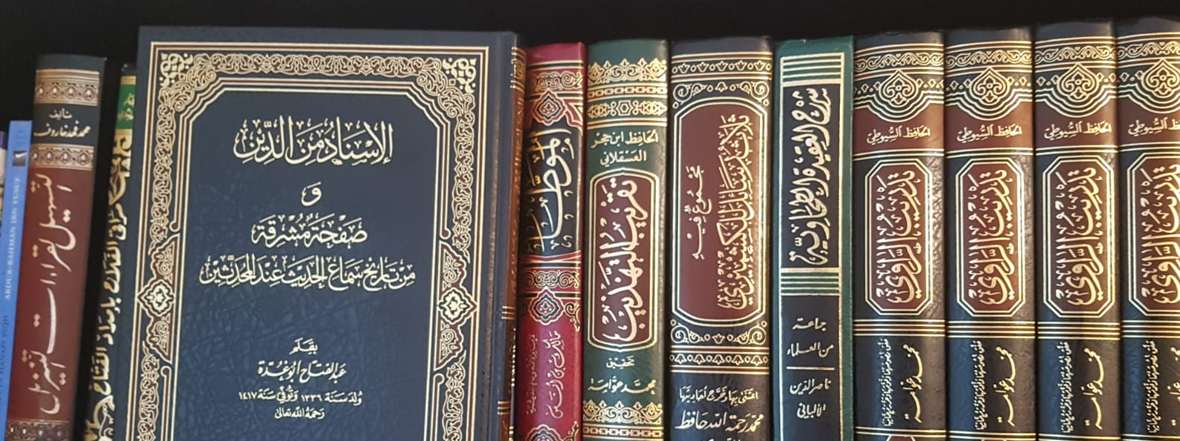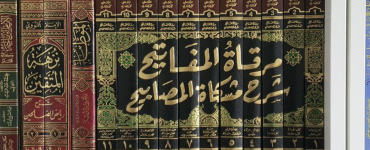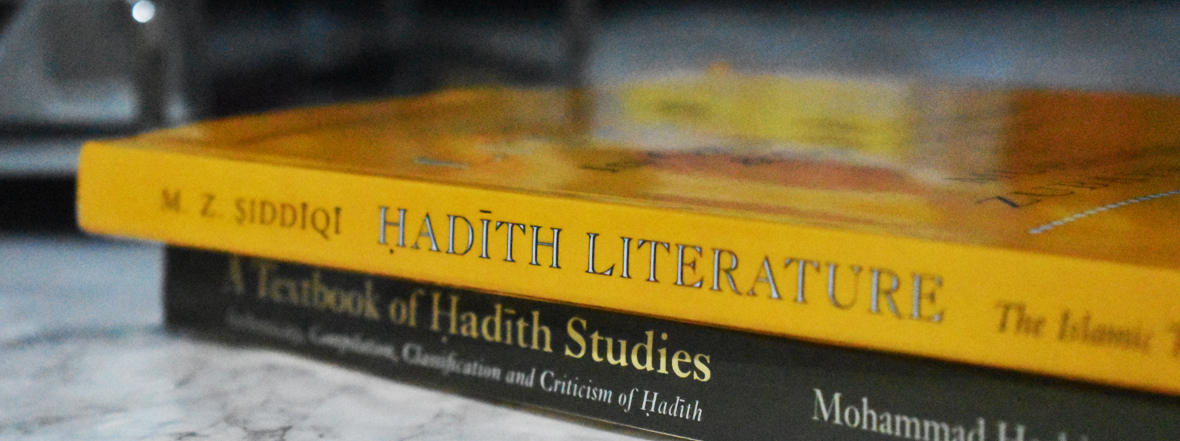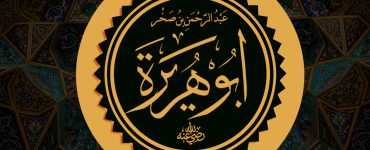Question:
I have read one of your recent articles and I wanted to know, what is the legal requirement for someone to be considered a knowledgeable scholar whom we can take knowledge from? Is Isnad (chain of transmission) one of the requirements and is there any evidence for this deduced from the sources?
Also, I have noticed that Isnad is not usually mentioned by the scholars as a prerequisite for someone to be considered a Mujtahid. Can one therefore be self taught?
There are two aspects to your question. The first is regarding the importance of the chain of transmission (Isnad/Sanad) in relating Islamic knowledge, and the second concerns the status of learning from a qualified teacher. I will attempt to shed some light, Insha Allah, on both of these topics in the light of the Qur’an, Sunna and the statements of classical scholars.
Isnad (chain of transmission)
Allah Almighty has honoured the Ummah of the best of creation, our master Muhammad (Allah bless him & give him peace) with many special characteristics that were not given to any other nation before us.
From among these favours is the unrivalled and unique feature of Isnad in relating the various sciences of Islamic knowledge. Isnad was regarded by the early Muslims (salaf) as the first and primary condition in relating any aspect of Shariah even if it was merely relating one word.
With this, Allah Most High fulfilled his promise of preserving the Deen which includes the book of Allah, Sunnah of the beloved of Allah and the various Islamic sciences that are indispensable in understanding the former two.
Allah Most High says:
“We have without doubt, sent down the Message; and we will assuredly guard it.” (Surah al-Hijr, V.9)
The “message” here refers to the book of Allah and also the Sunnah of his blessed Messenger (Allah bless him & give him peace), for whatever the Messenger of Allah (Allah bless him & give him peace) says is from Allah Almighty, as Allah Most High says:
“Nor does he (the Messenger of Allah) say (aught) of (his own) desire. It is no less than revelation (wahi) sent down to him.” (al-Najm, V. 3-4)
The Messenger of Allah (Allah bless him & give him peace) explained both verbally and practically the contents of the book of Allah. The Qur’an is quite ambiguous and limited in stating the laws of Shariah, and the Messenger of Allah’s (Allah (Allah bless him & give him peace) duty was to explain these injunctions.
Allah Most High says to his Messenger (Allah bless him & give him peace):
“And We have sent down unto you the Message (Qur’an); that you may explain clearly to men what is sent for them.” (al-Nahl, V. 44)
So the promise of preserving the Deen is not restricted to the Qur’an, rather it encompasses the Sunnah and also the Companion’s (Allah be pleased with them all) understanding of the Sunnah and the understanding of those who took from them.
Isnad is a unique feature of the Messenger of Allah’s (Allah bless him & give him peace) Ummah. No other nation, religion or community can claim or boast to have such rigorous analysis of the various aspects of their faith.
Early Muslim scholars examined and analysed each and every statement that came to them, whether it was the statement of the Messenger of Allah (Allah bless him & give him peace), his companions (Allah be pleased with them all) or anyone else. They studied the life and character of those who were part of the transmitting chain (isnad) in the strictest way possible.
Thus, the Ummah witnessed an amazing introduction of the “science of studying the reporters of Hadith” (rijal al-Hadith) which was unprecedented and is unrivalled till today. The recording of the names, dates of birth, dates of demise, qualities and characteristics of thousands and thousands of people is something that only Muslims possess.
Books such as, Tahzib al-Kamal by al-Mizzi, Tahzib al-Tahzib by Ibn Hajar al-Asqalani, Mizan al-I’tidal by Dhahabi and Lisan al-Mizan by Ibn Hajar are just some examples of this amazing phenomenon. There are also books that are dedicated to preserving the biographies of the Sahaba, such as Tabqat of Ibn Sa’d, al-Isti’ab by Ibn Abd al-Barr, Usd al-Ghaba by Ibn al-Athir and al-Isaba by Ibn Hajar, in which the biographies of approximately ten thousand companions (Allah be pleased with them all) have been covered.
Imam Abd Allah ibn al-Mubarak (Allah be pleased with him) said:
“Isnad is part of religion (deen), and if it was not for Isnad, one would have said whatever one desired. When it is said (to the one who speaks without an Isnad): “Who informed you? He remains silent and bewildered.” (See: Introduction to Sahih Muslim, 1/87, al-Jami’ li akhlaq al-rawi wa adab al-sami’ and others)
He (Abd Allah ibn al-Mubarak) also stated:
“The one who seeks matters of his deen without an Isnad is similar to the one who climbs to the roof without a ladder.”
Sufyan al-Thawri (Allah have mercy on him) said:
“Isnad is the weapon of a believer. When one does not possess a weapon, then with what will he combat?.”
Sayyiduna Imam Shafi’i (Allah have mercy on him) says:
“The example of the one who seeks Hadith without an Isnad is of a person who gathers wood in the night. He carries a bundle of sticks not knowing that there is a snake in it.” (m, meaning, he gathers and collects all types of narrations, the genuine and spurious, ).
Baqiyya ibn al-Walid (Allah have mercy on him) once related to Hammad ibn Zaid (Allah have mercy on him) certain narrations that were void of Isnad. So Hammad said: “If only they had wings.”
Imam Ibn Taymiyya (Allah have mercy on him) states:
“Isnad is a unique feature of this Ummah and Islam. Then from among the Muslims, it is a speciality of the Ahl al-Sunnah wa al-Jama’ah.”
(The above statements have been recorded by Shaykh Abd al-Fattah Abu Ghudda (Allah have mercy on him) in his excellent work, al-Isnad min al-Din P. 18-20)
These and many other similar statements of the predecessors imply that the early Muslims held Isnad to be indispensable in order to acquire Knowledge. So much so, that in order to relate even one word in their books, they would mention a whole chain of transmission that covered three or four lines.
Isnad was not only mentioned in order to narrate Prophetic traditions (hadith), rather, it was related for every form of knowledge, such as the exegesis (tafsir) of the Qur’an, stories of the pious and worshippers, incidents of history, etc.
After the Prophetic traditions were gathered in the great compilations, such as Sahih al-Bukhari, Sahih Muslim and others, and other compilations in various other Islamic sciences, it was not deemed necessary to relate every statement with a chain of transmission going back to its original authority. Rather, it was sufficient to have an Isnad or Sanad going back to the author. The Isnad of the author going back to the original authority would be mentioned in his book.
Till this very day, we have scholars from around the globe relating Prophetic traditions and other branches of Islamic knowledge with a chain that goes all the way back to the authors of the respective books.
The six major books of Hadith are generally taught with an Isnad that goes back to their authors, and from them to the Messenger of Allah (Allah bless him & give him peace). Many scholars are seen to travel and make distant journeys in order to acquire Ijazah and a higher form of Isnad.
In terms of Isnad with regards to prophetic traditions (hadith), the scholars of the Indian subcontinent are (perhaps) at the forefront. The science of Hadith is given special attention there and almost every student that studies in the various Islamic institutions (Dar al-Ulooms) is blessed with an Isnad in each of the major books of Hadith. Even major Arab scholars are seen to travel to Indo/Pak in order to acquire Ijazah and Isnad from the great Hadith masters.
In terms of other branches of knowledge, such as the science of Tajweed, Fiqh, etc, we see the Arab scholars at the forefront in relating and teaching the various books with Isnad. Major scholars in Syria and elsewhere have a chain in the recitation and memorization of the Qur’an that goes back to the Messenger of Allah (Allah bless him & give him peace) via the angel Jibril to Allah Almighty Himself.
The major books in Hanafi Fiqh (and other Madhhabs) are taught with a Isnad/Sanad going back to their authors and to Sayyiduna Imam Abu Hanifa (Allah be pleased with him) himself. Books in other sciences are also taught and related in a similar manner.
In conclusion, Isnad (or Sanad) is a unique feature with which our Ummah has been blessed. It has always been regarded to be indispensable in teaching and seeking knowledge. Scholars mention, that even today, one should acquire knowledge from a scholar who has an Isnad or at least a teacher who he studied with. Having a complete chain of transmission is not a pre-requisite for teaching. However, what is necessary, is that the one from whom one takes his/her knowledge, is amongst those who studied by other shuyukh. This is discussed further in the following section.
Learning from a qualified teacher
Allah Most High created man different from animals. Animals are not in need of a teacher or trainer in a way man is. We see for example that, when a fish is born, it automatically begins to swim without being taught how to do so. If a man was to take the example of the fish and throw his new-born baby into the river thinking that he will swim, then he is without doubt insane, for a fish is not in need of an instructor who instructs it how to swim, while a man needs a tutor to teach him to swim.
Take the example of the new-born chick; the moment it comes out of the egg, it begins to nibble at food without being taught. However, a human baby will not know how to eat unless it is taught practically how to consume the various types of foods.
It is the Sunnah (way) of Allah Almighty that he fashioned human beings in such a way that they are in need of practical instruction from a teacher in order to learn any science, technique or craft. From the moment one is born, one is in need of practical teaching and guidance in all aspects of life.
There is almost consensus on the fact that it is virtually impossible for one to master any science or art in the world without the guidance and tutelage of a qualified teacher under whom one practically learns the fundamentals of that science. It is not possible to gain expertise in any field unless one submits himself to the guidance of a teacher.
Take for example the science of medicine. If one was to think that I will read and study the books on medical science in the comfort of my home, thus become a medical practitioner, then he will be considered to be insane by almost everybody. If this individual was to perform surgery on a patient or begins to treat people, then his patients will not end up anywhere other than the graveyard!
Even if this individual is very talented and knowledgeable, the guidance of a tutor is indispensable. Suppose this individual is able to understand the books of medical science and he masters the language in which the books are written, he will still not be permitted to work as a physician or surgeon unless he studies under the guidance of a qualified person in the field of medical science. No government will ever allow this individual to take up the medical profession, due to the fact that he did not pursue the method necessary in order to take up this profession.
It is the same with all the other sciences of the world in that the guidance of a teacher is necessary. No body would allow you to practice law until you don’t attend a law school and learn form a qualified barrister. Let alone the major sciences, even the simple art of cooking is not achieved by merely reading a book. There are several books published explaining the methods of cooking different types of food. If an individual who had never cooked in his life before, cooked by merely reading the procedure of cooking mentioned in the book, then you can imagined what the outcome would be!
So, it is the nature of man that he can not acquire knowledge merely from books unless he has a teacher and mentor to train and guide him. He needs to stay in the company of a qualified teacher who will help and assist him on every step and save him from the errors that may be committed. This applies to every science, art and craft, and sacred and religious knowledge is of no exception. It is not possible for one to acquire sacred knowledge unless one is trained by a qualified teacher and mentor.
This is the secret behind a book or scripture never being revealed except Allah Almighty sent a Messenger to explain its contents. There are many examples where a Prophet was sent by Allah Almighty and no book or scripture was revealed unto him, but there is not a single case where a book was revealed without a Prophet carrying it.
The simple reason behind this is that if a book was sent on its own, man would not possess the capability to understand it without the teaching of a Prophet. If Allah wished, He could have sent the book on its own. Every individual could have found a book when he woke up in the morning, and a voice from the heavens would have declared: “Obey what is in this book” but Allah, the Creator of mankind, who is fully aware of the human instincts, chose to send the book with a teacher who would explain the contents of the book, both practically and verbally.
Allah Most High explains this concept in the following verse:
“Allah did confer a great favour on the believers when He sent amongst them a Messenger from among themselves, reciting upon them verses (of the book), sanctifying them, and teaching them the scripture (book) and wisdom, while before that, they had been in manifest error.” (Surah Ali Imran, V. 164)
Similarly, Allah Most High says:
“And We have sent down unto you (O Messenger) the message, that you may explain clearly to men what is sent for them.” (al-Nahl, V. 44)
Therefore, it is the Sunnah of Allah Almighty that He has kept two means for the guidance of mankind. One is through the medium of His books (kitab Allah) and the other is the Prophets and their successors. Hence, both, the book of Allah (kitab Allah) and men of Allah (rijal Allah) are necessary for one’s guidance. Sufficing with one of the two will surely lead to deviation.
At this point, it would be useful to quote the great scholar of Usul, Imam al-Shatbi (Allah have mercy on him). The following is the crux of what he stated on this issue in his renowned treatise al-Muwafaqat:
“The most beneficial and effectual way of gaining knowledge is by learning it from those who are masters in their fields. It is necessary to have a teacher in aspects of knowledge that need explanation and interpretation. It is not impossible for one to gain knowledge without a teacher; however, normally it is observed that a teacher is of utmost importance. This is, somewhat, agreed upon by the scholars.
Scholars said: “Sacred knowledge was in the hearts of men, then it moved into the books and the keys to these books are in the hands of scholars (rijal).” This implies the necessity of acquiring knowledge from the people who master it.
The basis for this is the Hadith which states: “Verily Allah does not take away knowledge by snatching it from the people but He takes away knowledge by taking away the scholars, so that when He leaves no learned person, people appoint ignorant as their leaders. They are asked to deliver religious verdicts and they deliver them without knowledge, they go astray, and lead others astray.” (Sahih al-Bukhari & Sahih Muslim) If this is so, then the scholars are without doubt the keys for this knowledge.” (al-Muwafaqat)
Imam al-Shatbi (Allah have mercy on him) further mentions three signs and characteristics of a expert qualified teacher:
1) He practices what he teaches,
2) He himself has been trained by a qualified scholar,
3) His students follow and pursue in his footsteps, for if his students generally tend to not follow him, then this is a sign that there is something inherently wrong with him. (ibid)
There are many benefits and wisdoms in learning from a teacher: Sound understanding of the texts, its correct interpretation, being saved from making errors in understanding the texts (for each science has its own special terminologies), getting questions and queries that may arise answered, practical application of the knowledge and obtaining the Baraka and light of guidance from that special teacher-student relationship are just a few to mention.
In conclusion, it is necessary for one that he learns his knowledge from a scholar of knowledge, piety and wisdom, and who himself has been taught and trained by a similar scholar. That does not mean it is incumbent for an individual that each time he picks up a book, he must find a scholar to teach him, rather one needs to study the fundamentals of each science with those who are qualified, thus become acquainted with the different terminologies, terms and expressions used. Thereafter, one may study a book on his own with always referring to senior scholars whenever something is unclear.
And Allah Knows Best






